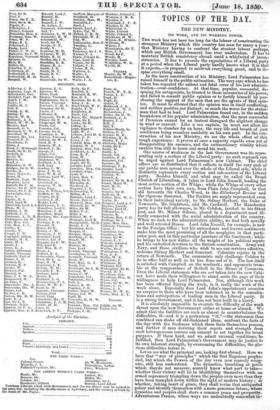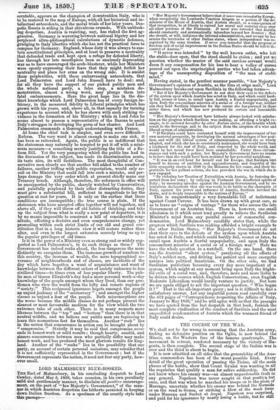TOPICS OF THE DAY.
THE NEW MINISTRY.
ITS WORK, AND ITS WORKING POWER.
THE week has not been too long for the labour of constructing the strongest Ministry which this country has seen for many a year ;
that Ministry having to- confront the stoutest labour perhaps which any British Government has ever undertaken. It has tO maintain British consistency abroad amid a whirlwind of incon-
sistencies. It has to execute the expectations of a Liberal party at a period when the Liberal party hardly knows what it is that it expeets,—is prepared to mistrust everything great, and to de- spise everything small.
In the mere construction of his Ministry, Lord Palmerston has raised himself in the public estimation. The very care which he has taken has repealed the salient and fatal error of his last adminis- tration—over-confidence. At that time, popular, successful, de- spising his antagonists, he trusted to those accessories of his power, and failed to consult public opinion or to fortify himself by pur- chasing the support of the men that are the agents of that opin- ion. It must be allowed that the opinion was in itself conflicting, and neither positive nor distinct; so much the worse for the states- man that had to lead. Lord Palmerston found out, in the sudden breakdown of his popular administration, that the most successful of Premiers cannot for an instant disregard the slightest change in wind or current: Like a sea captain, he must not allow his vigilance to slumber for an hour, the very life and breath of -just confidence being ceaseless assiduity on his own part. In the con- struction of his new Ministry, we see the whole effect of this rough experience : it proves at once a sagacity capable even yet of disappointing his enemies, and the extraordinary vitality which enables him still to learn and mend his work.
One source of weakness in the last Government was its repre- senting only a section of the Liberal party : no such reproach can be urged against Lord Palmerston's new Cabinet. The chief
offices are so distributed that it collects to itself the very pick of our public men spread over the whole of the Liberal side, while it distinctly represents every section and sub-section of the Liberal party. Besides himself, and what may be called the Broad Church of Liberalism, it takes in Lord John Russell, leading the most active section of the Whigs ; while the Whigs of every other section have their own men, from Plain John Campbell, or that old favourite Sir Charles Wood, to the Edinburgh Review and the vigorous Somerset. The Peelites are amply represented even in their individual variety, by Mr. Sidney Herbert, the Duke of Newcastle, Mr. Gladstone, and Mr. Cardwell. The Manchester party has its full allowance, in Mr. Cobden, invited to his fittest post, and Mr. Milner Gibson, placed in a department most di- rectly connected with the social administration of the country. When we look to the administrative ability, we find both novelty and well attested fitness. Lord John Russell, for example, is new to the Foreign Office ; but liis antecedents and known sentiments make him the most promising of all the neophytes in that parti- cular post, and in this particular juncture of the Continent ; while he brings to his new duties all the weight of his political repute and his embodied devotion to the British constitution. Army and Navy, and those civilians who wish to see our services effective, welcome Sidney Herbert and Somerset. Colonists rejoice in the return of Newcastle. The economists only challenge Cobden to - do in office half as well as he has done out of it. The law itself is satisfied with Campbell on the woolsack ; and opponents trem- ble at the reappearance of Bethell in the House of Commons. Even the Liberal statesmen who are not taken into the new Cabi- net have made their willingness to stand aside the gage of their willingness to help Lord Palmerston. Nor, although this work has been effected during the week, is it really the work of the week alone. Especially does Lord John's appointment occasion no surprise to those who have been informed as to the consulta- tions and anticipations of leading men in the Liberal party. It is a strong Government, and it has not been built in a hurry.
It is absolutely impossible to overrate the difficulty of the work thrust upon the new Government either at home or abroad. We admit that the facilities are such as almost to counterbalance the difficulties, if—and it is a portentous " if,"—the statesmen thus combined can shake off old-fashioned ideas, confront the facts of the day with the freshness which those facts themselves possess, and further if men deriving their repute and strength from such heterogeneous sources can consent to act together for broad purposes. If these hard, and we admit unusual conditions, be fulfilled, then Lord Palmerston's Government may do justice to its own inherent strength, by overcoming the difficulties, the glo- rious difficulties before it.
Let us see what the principal are, looking first abroad. Here we have that "war of principles" which the first Napoleon prophe- sied, but which the Powers of the day even now scarcely recog- nize, still less understand. The dynasties, trembling at perils which theydo not measure, scarcely know what part to take— whether their victory will lie in identifying themselves with an armed supremacy trampling down the peoples even more than they have been trampled down within the sight of modern history ; or whether, taking heart of grace, they shall revise that antiquated policy and identify themselves with a more generous future, where dynasties and peoples shall share a common peace and prosperity. Adventurous France, whose ways are undoubtedly somewhat in-
scrutable, appears as the champion of downtrodden Italy, who is to be restored to the map of Europe, with all her historical and in- tellectual antecedents, and the moral trials of her later years. Des- potic Russia is aiding in that chivalrous crusade. With unblush- ing despotism, Austria is resisting, nay, has risked the first ag- gression. Germany is wavering between national bigotry and her perplexed ultra-philosophical calculations of dynastic defences, grudging to Italy liberties which she has not the practical force tO compass for Germany. England, whose duty it was always to sus- tain constitutional principles, and at least to preserve a neutrality that defended trade and. kept open a refuge for defeated liberty, has through her late mouthpiece been so anxiously deprecating war as to have encouraged the arch-blusterer, while her Ministers were openly expressing their fears that they might forfeit her neutrality and place her arms on the wrong side. It is amidst these perplexities, with these embarrassing antecedents, that Lord Palmerston and Lord John Russell have to deal; and, for all they have the support of our picked public men and the whole national party, a false step, a mistaken de- monstration, almost a wrong word, may plunge them into fatal embarrassments. Here the great hope lies in the dis- tinct knowledge which Lord Palmerston has of every foreign in- tricacy, in the measured fidelity to Liberal principles which has grown with his years, and, above all, in that capacity for turning experience to account which he has shown with such striking vi- vidness in the formation of his Ministry; while in Lord John he seems almost to possess a representative of the Barons to assist Italy's strugges in developing the germ of her charter. And Lord Palmerston commands a thorough understanding with France. At home the chief task is simpler, and even more difficult— Reform. The very word is almost enough to make one sick, it has been so reiterated. Again, the public is so indifferent that the statesman may naturally be tempted to put it off with a mini- mum measure—a something merely justifying the title of a Re- form Bill. Yet the very pampering which the publics has had in the discussion of the subject, has made its discrimination acute, its taste nice, its will fastidious. The most thoughtful of Con- servative men clearly see that another bill added to the number of failures, another trifling with public expectation, would only re- coil on the Ministry that could fall into such a mistake, and per- haps damage the very order which at present chiefly mans our Treasury bench. Although, therefore, the reformers in office will be unsupported by the public, sharply watched by Conservatives, and painfully perplexed by their other distracting duties, they must give a substantial bill, sufficient in magnitude to fay the question at rest for years. It is only on the surface that these conditions are incompatible; the true course is plain. If the statesmen who have accepted office together will act together, and above all, if they will throw off old habits of thinking, and take up the subject from what is really a new point of departure, it is by no means impossible to construct a bill of considerable mag- nitude affecting a decisive and even comprehensive change, yet proceeding within such strict limits of our old and grand con- stitution that in a long historic view it will restore rather than alter, and even in the largest extension scarcely bring us up to the popular privileges of old times.
Is it in the power of a Ministry even so strong and so widely sup- ported as Lord Palmerston's to do such things as these ? The Government has indeed rocks ahead, the less dangerous the more distinctly we recognize them. The immense growth of numbers in , this country, the increase of wealth, the mere topographical se- verance of neighbourhoods and of classes, are incidents of the day which have begotten a want of acquaintance and want of knowledge between the different orders of society unknown to less civilized times—to times even of less popular liberty. The pub- lic men of Queen Elizabeth's day had a more personal work-a-day
knowledge of the people amongst whom they personal
than our gen-
tlemen who view the world from the lofty and remote regions of "society" This reciprocal ignorance begets amongst the people an unjust jealousy of the " aristocracy " ' • and amongst the higher classes as unjust a fear of the people. Both misconceptions are the worse because the middle classes do not perhaps present the clearest or most favourable medium for the view which the two extremes take of each other. There is in many respects more likeness between the " to " and "bottom" than there is in that neutral middle, and we believe our public men are beginning to learn this momentous fact for themselves. Another " rock ' lies in the notion that concurrence in. action can be brought about by " compromise. " Strictly it may be said that compromise never ends in honest work or solid results ; though hearty, candid, and sincere concurrence between men who partially differ may make honest work, and has produced the most glorious results for Eng- land. Another of the "rocks" lies in the possibility that one party, on account of certain personal omissions, may consider that it is not sufficiently represented in the Government ; but if the Government represents the nation, it need not fear any party, how- ever small.



































 Previous page
Previous page